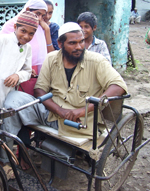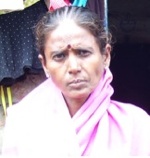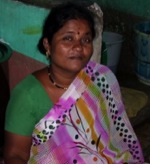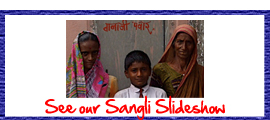Our Beneficiaries
Many FSA funding beneficiaries are slum citizens who live in extreme poverty and are the most vulnerable members of society: the elderly with no savings, the handicapped with no means to earn an income, women suffering from AIDS, and those living in extreme poverty. These and other severely marginalized people have benefited from gaining access to safe and clean sanitation systems, and, perhaps more importantly, from improved dignity of life. We work with Shelter Associates to identify the most deserving recipients of our funds.
Here are some of their stories…
 A Very Private Matter: Ramzan Ali Jatkar, Age 27
A Very Private Matter: Ramzan Ali Jatkar, Age 27
Ramzan, a double amputee, lost his legs in a hit and run accident with a truck at the age of 27. He lives with his wife and 3 children, all under the age of 5, in a two-room slum tenement in Miraj that he inherited from his parents.
When asked if he had looked into the possibility of prosthetic limbs, Ramzan said that he has not even considered it a possibility. “We have barely enough to get two meals a day,” he explained. Before his accident, Ramzan cleaned cattle hides for a living and supplemented his meager earning by grazing his neighbor’s livestock.
Ramzan explains that before was given a toilet from FSA funds he needed frequent assistance of the neighboring youth to help him to the nearby fields for defecation. He appreciates that he no longer depends on others for what he considers, understandably, to be a very private matter.
 Matter of Human Dignity: Suman Kamle, Age 35
Matter of Human Dignity: Suman Kamle, Age 35
Suman looks much older than her 35 years. She was diagnosed with AIDS and continues to deteriorate in health as her disease progresses. Her family live on her son’s daily wage of Rs. 40 (1 USD) on the few days of the week that he can find work.
Suman has worked as a prostitute from age 13 then until she turned 30 at which time her son convinced her to stop work, as he felt “ashamed” of her. Suman gets some assistance in the form of food staples from World Vision and receives a small stipend to help offset medical expenses. Even with this assistance her family often goes hungry.
Suman’s toilet was the last to build in the slum, as she had no means of contributing her share of 20% equity in the individual toilets that were being built in Pandharpur Chawl where she lives. Suman explains that she needs to go to the toilet several times a night, and until FSA funded the down payment for her individual toilet, she had to make the exhausting journey to the railway lines almost a kilometer away where she is often shooed away by railway employees. Not only is the individual toilet more convenient for her, it is also a matter of human dignity.
 Fighting Discrimiation: Rekha Kamle, Age 40
Fighting Discrimiation: Rekha Kamle, Age 40
As the eldest of many children, Rekha Kamle needed to start earning money at a young age. When 12 years old, her aunt initiated Rekha into prostitution to support her family. Today, at age 40, she has stopped working as a prostitute and volunteers as a peer educator at a community-based organization that fights for prostitute’s rights and provides healthcare services and information on sexually transmitted diseases.
Rekha and her children face discrimination and harassment since there is considerable social stigma against even former prostitutes. Rekha says that if she could, she would like to move out of the slum, but the chances of her being able to afford alternative housing are negligible with her resources.
A toilet block funded by FSA has helped her upgrade her tenement of two rooms in the Miraj slum. She is grateful that the toilet block came in when it did: the community toilet closest to her not only has long lines one must wait in, it is scheduled to be demolished as part of a road-widening scheme.





